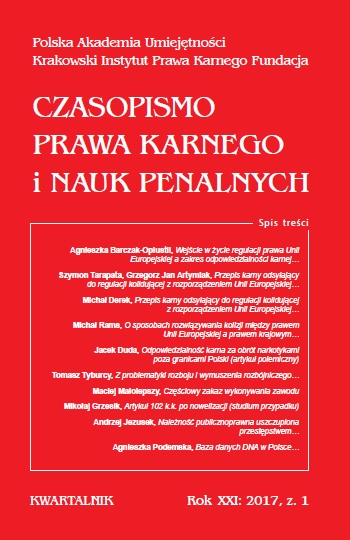Przepis karny odsyłający do regulacji kolidującej z rozporządzeniem Unii Europejskiej (konsekwencje w perspektywie zasady nullum crimen sine lege)
Criminal provision referring to the regulations in collision with EU law (consequences in perspective of the nullum crimen sine lege principle).
Author(s): Michał DerekSubject(s): Criminal Law, EU-Legislation
Published by: Polska Akademia Umiejętności / Krakowski Instytut Prawa Karnego Fundacja
Keywords: EU law; trading of financial instruments; prohibition of insider dealing; rules of statutory interpretation
Summary/Abstract: W artykule podjęto próbę rozstrzygnięcia kwestii przypisania sprawcy odpowiedzialności karnej za zachowanie polegające na wykorzystaniu informacji niejawnej wbrew zakazowi określonemu w art. 156 ust. 1 ustawy z dnia 29 lipca 2005 r. o obrocie instrumentami finansowymi, wobec jednoczesnego obowiązywania rozporządzenia Unii Europejskiej definiującego pojęcie informacji niejawnej oraz sposoby jej wykorzystywania. W pracy odwołano się do rozróżnienia „obowiązywania” i „stosowania” wypracowanego w nauce teorii prawa. W dalszej kolejności wskazano na dogmatyczne podstawy zasady pierwszeństwa prawa Unii Europejskiej oraz instytucji odesłania w kontekście zasady nullum crimen sine lege. W podsumowaniu sformułowano wniosek, zgodnie z którym niestosowalny in concreto art. 156 ust. 1 ustawy o obrocie instrumentami finansowymi stanowi jedyne źródło bezprawności dla typu czynu zabronionego określonego w art. 181 ust. 1 tej ustawy. Stąd zachowanie naruszające zakaz ujawniania informacji poufnej wyrażony w rozporządzeniu MAR oraz w ustawie nie jest obecnie objęte kryminalizacją. The article is an attempt to resolve the issue of imposition of criminal liability for the usage of classified information contrary to the prohibition set forth in Art. 156 ust. 1 of the Act of 29th July 2005 on Trading in Financial Instruments. It needs to be noted that EU law defines notion of classified information, and determines ways of its use. Article refers to the distinction between “validity of law” and “application of law”, as it was developed in theory of law. Furthermore, the dogmatic foundations for the principle of primacy of EU law has been also noted, along with mentioning the regulations that refer to another provisions. It is stated in conclusion that Art. 156 ust. 1 of the Act of 29th July 2005 on Trading in Financial Instruments, which cannot be applied in any particular case, is the only source determining the unlawfulness of the prohibited act specified in Art. 181 of mentioned Act. Hence, the conduct violating the prohibition of disclosure of confidential information, as stated in the MAR Regulation and in the Act on Trading in Financial Instruments, is not currently subject to criminalization.
Journal: Czasopismo Prawa Karnego i Nauk Penalnych
- Issue Year: 21/2017
- Issue No: 1
- Page Range: 45-60
- Page Count: 16
- Language: Polish

